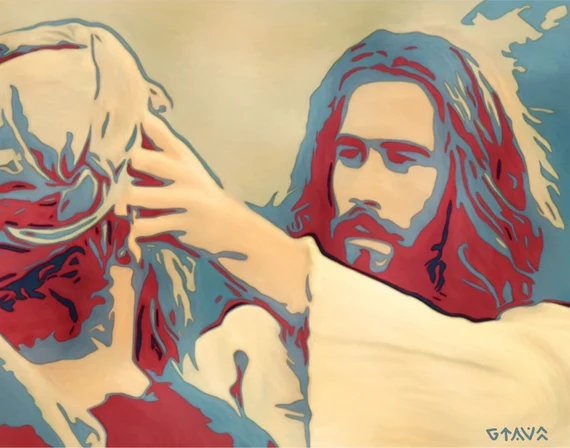While I breathe, I hope. Cicero
Jesus has left Galilee for the last time in his earthly ministry. Two-thirds of his ministry has taken place in this region and its surroundings. He was raised in one of its many small towns, brought up in a loving family, learned the carpentry trade with his father, working in wood and stone. His base for the past three and a half years has been the town of Capernaum on the north shore of the Sea of Galilee, a body of water he loved. From there he often went up into the hills to pray.
Now, his face turned to Jerusalem, he leaves behind many hundreds of the healed, the delivered, and those restored to life. His final Passover is near. He will travel to Jerusalem with crowds of other pilgrims for this annual observance and its accompanying celebration.
Despite already having told his disciples twice in clear and unmistakable terms what awaited him in Jerusalem, they have not truly discerned the horrifying, yet glorious truth. He will tell them one more time. The deadly plans have been laid and now await their master in Jerusalem. But that will not be all:
Listen, we are going up to Jerusalem, where the Son of Man will be betrayed to the leading priests and the teachers of religious law. They will sentence him to die. Then they will hand him over to the Romans to be mocked, flogged with a whip, and crucified. But on the third day he will be raised from the dead.**
Like all of us in our humanity, with our preconceived notions of What Cannot Possibly Take Place, they refuse to apprehend Jesus’ words. Even so, every step takes them closer to fulfillment.
First, they will enter the city of Jericho for an appointment with a blind man.
~~~~~~~~~~~~~~~~~~~~~~~~~~~~~~~~~~~~~~~~~~~~~~~~~~~~
It was true, then. Word was spreading through the city like a desert wildfire. The rabbi, the prophet, the healer, would be passing through.
For the past several days, scriptures have been scrolling through his mind. From the age of thirteen he had gone to synagogue with his father, and, with great intensity, his mind had absorbed the teachings of the rabbis. The prophet Isaiah seemed to be speaking directly to him: “Bartimaeus, your God will come and save you. Then your blind eyes will be opened.”* He would test this word, this prophecy, this great and terrible hope that beat in his chest.
Bartimaeus has been at his usual station by the western gate of the city since early morning. “Generous today,” he says to himself. He pats his worn leather pouch bulging with coins—each one minted with the face of the despised Herod the Great.
The spring sun has caused the day to become uncomfortably warm. But as his ears catch the excited chatter flowing past him, he forgets his discomfort. Seated on his stool by the side of the road, holding his ever-present stick in one hand, he continues to extend his other palm, carefully placing the coins dropped there in his pouch.
The volume of voices rises. The crowd is growing and he pushes his stool back into the rocks lining the roadway. Now he certainly risks stumbling. Was today the day? Was the rabbi actually approaching? What if he couldn’t reach him through the crowd? He might be trampled in any event. Now he can tell that the center of the noise and tumult is slowly passing by. He can bear it no longer. Taking hold of his stick, he raises himself up. From deep within his being, erupting from a place of desperate hope, a cry is torn from him.
Jesus, Son of David! Have mercy on me!
Someone grabs his shoulder, warning him to be quiet. Bartimaeus is past being hushed. He takes a deep breath and cries out again, louder this time, as a sob shakes him.
Jesus, Son of David! Have mercy on me!
A hush descends. It feels as though the very air silences sound. He hears a voice, low and very calm, one he has never before heard, but is as familiar as his own.
Bring him to me.
Hands, kinder this time, guide him slowly, carefully to the voice. He stands trembling.
What do you want me to do for you?
The words take a moment to sort themselves out in his reeling mind. What do you want me to do for you? One thing. I want only one thing, Lord, Messiah, Healer. His voice is raw as he answers the question that will change his life.
Lord, that I may receive my sight.
He hears sandals on pebbles as Jesus move closer. Hands, with a gentle pressure, cover his eyes. He flinches slightly at the unexpected touch.
Receive your sight. Your faith has made you well.
Suddenly, as though erupting from his innermost being, light in great waves bursts through Bartimaeus. washing through him in a fiery illumination. He opens his eyes, the eyes that have known nothing his entire life but darkness.
The first thing he sees, is the healer.
~~~~~~~~~~~~~~~~~~~~~~~~~~~~
Mercy is not merely a passive emotion. It is also an active desire to remove the cause of distress in others. Jesus modeled mercy and compassion even into the final hours before his death.
And the Lord’s pity for the sick, the possessed, the outcast always surpassed that of those around him.
- The disciples rebuke children approaching the Lord. Jesus says, “Let them come.”
- Simon the Pharisee condemns the sinful woman. Jesus says, “She has done something wonderful.”
- The crowd seeks to hush a desperate blind man. Jesus says, “Bring him to me.”
How often does our impatience or irritation or hurry get in the way of something the Healer, the Restorer, would do? It is something to ponder in this season.
*Isaiah 35:4 & 5, my paraphrase
** Matthew 20:19 NLT
Photo from a giclee print, by artist Presten Vejil at TraverseNM

